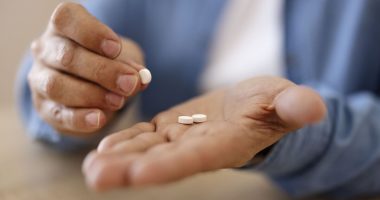Share this @internewscast.com
Cardiologist Henry Ting, MD, MBA joined the Delta Airlines team as its chief health officer back in 2021, when reinventing air travel in the midst of a pandemic was pivotal. Today, his scope reaches well beyond keeping COVID-19 out of planes. Dr. Ting has built a team that’s helped the airline roll out an extensive update to its in-flight medical tools, including Medaire’s in-flight MedLink app, which allows the cabin crew to communicate with doctors on the ground in real time about medical emergencies on board. He’s also advised on important additions to on-board diagnostic equipment, such as pulse oximeters and automatic blood pressure cuffs.
“We sought to look at the most common medical emergencies we encounter and to provide the incremental equipment that we feel will make a better diagnosis,” Dr. Ting says.
Apparently, the most common symptoms people experience during flights are neurologic. This ranges from temporary loss of consciousness to seizures, he says. But pulmonary problems are also fairly common, including shortness of breath, chest pain, and chest heaviness. Delta’s additional tools are designed to help crew members more accurately determine the source of these symptoms and decide whether or not the plane needs to be diverted.
And while these new gadgets are great news for people experiencing medical distress on an airplane, some of these emergencies can be prevented by passengers exercising a little caution, and not sabotaging their own safety, Dr. Ting says. If you want to know how to stay healthy while flying, here he shares five things he would never do on a flight, no matter how long (or short) the trip.
Five things Delta’s chief health officer would never do while flying
1. Drink too much alcohol
We know. We know. We’re coming right out of the gate (pun intended) with a vibe crusher, but Dr. Ting says alcohol is a very common culprit behind in-flight medical emergencies. Throwing back too many mimosas at the airport bar to kick off your vacation may come back to bite you once you’re in the air. Alcohol is a diuretic, meaning excessive amounts of it can exacerbate the dehydration that travelers already experience on a plane due to low humidity levels in the cabin. The last thing you want is to miss your Thanksgiving dinner because you passed out on the plane after your fourth screwdriver and had to be diverted to the nearest hospital.
Dr. Ting says common sense is key: “Enjoy yourself. We’re going to try to take care of you and provide the best food and beverage, but do things in moderation like you would in real life.”
2. Put medicine in a checked bag
Whether you’re on a long-haul flight to Beijing or a quick two-hour trip to a nearby city, Dr. Ting says to stash all your essential medication in a personal item or carry-on. This is especially important for travelers with conditions that rely on fast-acting medicine (think: insulin for diabetics or epinephrine shots for people with severe allergies). But even if you think you can go a couple of hours without your inhaler or Valium, it’s always a good idea to have them in reach. Not only could they be essential if your condition starts to flare up, but if your flight gets delayed or your checked luggage gets lost (because let’s be real, it might), you won’t be stuck for a prolonged amount of time without your prescription.
3. Take sedatives
Maybe turbulence makes you white-knuckle the arm rests or you just can’t get comfortable enough to doze off on overnight flights. Whatever your reasoning, sedatives can seem pretty alluring on an airplane, but Dr. Ting cautions against them.
“When you take a medication, the intended effect may be to help you sleep or help you relax, but each of these medications affect the neurotransmitters and they can actually activate neurotransmitters,” Dr. Ting says. Rather than popping a Benadryl or melatonin, which might backfire, he suggests investing in a good neck pillow, wearing warm and comfy clothes on the plane, and bringing a small bag of your favorite candy to nosh on when you start to feel anxious.
4. Stay seated for the duration of long-haul flights
Most of us know the familiar feeling of our wrist buzzing when our Apple Watch or FitBit gently chastises us for being stationary for too long. Take your tech’s advice on long-haul flights and stand up every hour or so to keep your blood circulating and reduce the risk of clotting, Dr. Ting says. When your watch vibrates, take a short stroll to the bathroom or up and down the aisle. If you don’t want to disturb a sleeping seatmate, try some seated exercises like calf raises or ankle rolls.
5. Leave his mask at home
COVID-19 might seem like a distant memory but it still exists, along with a slew of other respiratory infections you don’t want to put a damper on your travels (influenza, RSV, the common cold). Dr. Ting suggests packing a mask in your carry-on in case you find yourself seated next to someone with the sniffles. “We found out from the pandemic that one-way masking works. So, you wearing a mask protects you from potentially catching any respiratory viruses. It doesn’t even have to be COVID,” he says.














